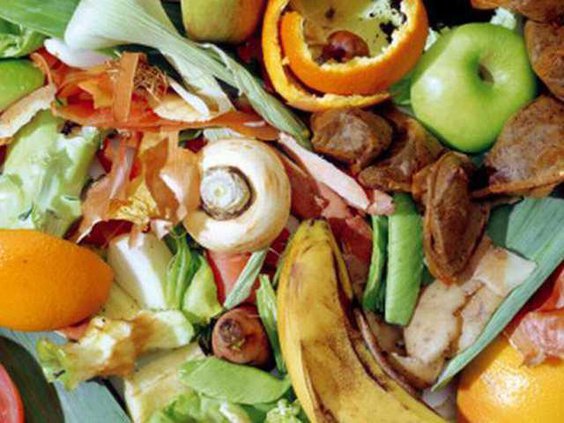Food-4-Less is about to become the greenest supermarket in Manteca if not all of the South County.
Starting next week Food-4-Less and the nearby International House of Pancakes are becoming the first commercial establishments in Manteca to recycle food waste. By this spring all commercial solid waste customers in Manteca that generate large amounts of food waste— primarily supermarkets, larger volume restaurants, schools, and hospitals — will be separating food waste from the rest of their garbage.
It is part of a state mandate to further reduce garbage that is landfilled by requiring food waste to be diverted to other uses.
Food waste — based on a survey made of random residential brown Toters switched out on a collection day that had their contents shifted through by hand — constitutes 35 percent of Manteca’s garbage. While that seems high it is below the state average for food waste in garbage at 40 percent.
Currently three elementary schools in Manteca Unified — Joshua Cowell, Brock Elliott and Walter Woodward —are recycling food waste from their cafeterias. The three schools generate an average of a ton of food waste each week that is currently being taken to Harvest Power in Lathrop where it is combined with green waste to create compost.
When Manteca completes its methane conversion plant at the wastewater treatment facility, food waste collected from Manteca as well as Tracy will be used to create clean burning gas to fuel the city’s new trucks that will be powered by compressed natural gas.
“The kids are doing a great job,” said City of Manteca Solid Waste Coordinator Rexie LeStrange of students separating food waste from other garbage when they are through with their lunches. “The food waste bins we collect are super clean. Occasionally there will be a milk cartoon in them but that’s it.”
LeStrange said the students have set a good example for businesses to follow.
All Manteca Unified campuses will have food waste recycling in place by the end of the year including rural Manteca schools as well as those in Lathrop and Stockton’s Weston Ranch neighborhood.
LeStrange said Allied Waste has agreed to place food waste collection bins in all of the schools within Manteca Unified that they service and take it to their own green waste compositing contractor.
That way all 23,500 Manteca Unified students will be doing the same thing when it comes to recycling food waste that includes not only what they don’t eat from their plates but fruit rinds, egg shells, and such as well.
“The schools (in Manteca) are incredibly good at recycling,” LeStrange said.
Fifteen years ago when she started working in Manteca, the trash bins at school campuses were stuffed with discarded paper. Now she said at least 90 percent of all trash schools generate is recycled.
“You can’t find a single piece of paper in their trash bins,” LeStrange said of the schools.
Manteca as a whole 25 years ago was not recycling anything. Fifteen years ago the city was recycling 18 percent of its garage. Today Manteca is at the 52 percent mark. Once the food waste recycling is in place Manteca expects to be recycling 75 percent of the solid waste the community generates.
Manteca and other California cities must reduce the food waste they bury by 50 percent by 2018 under state law. Eventually food waste recycling will be extended down to residential customers. In Manteca that may involve separating food waste at the Lovelace Transfer Station after it is collected from residential Toters.
LeStrange noted that while Manteca will avoid hefty fines form the state in the future by complying with the state law regarding food waste, there is an even bigger financial incentive for residents, businesses, and schools.
“It is incredibly expensive to landfill garbage,” she said.
Effective recycling programs and various cost-saving efficiencies that the city has put in place such as hybrid powered trucks as well as having a front-line crew of drivers always looking for ways to reduce expenses has allowed Manteca to go 13 plus years without a solid waste hike. It is an unmatched record for the Northern San Joaquin Valley.
The system being put into place to convert food waste to fuel is designed to help stabilize solid waste costs over the long haul. It may, however, require a rate increase depending on the final costs.
Recycling food waste next
Food-4-Less, IHOP first Manteca commercial ventures to recycle





